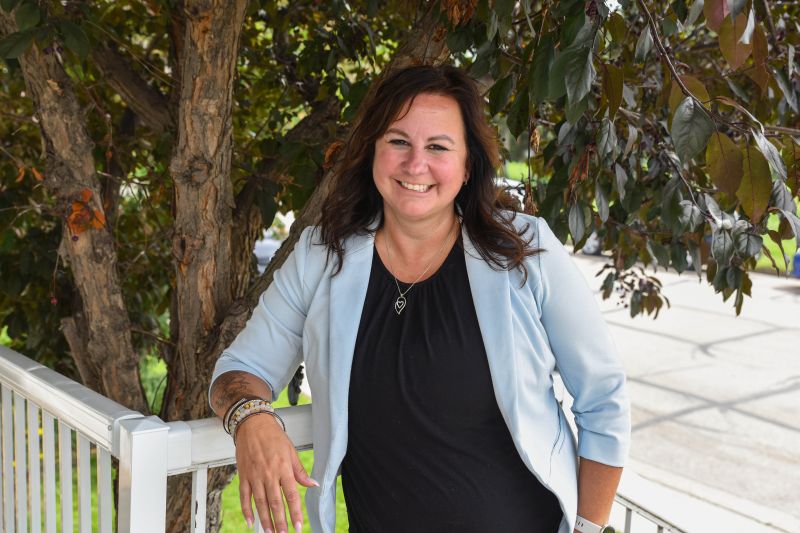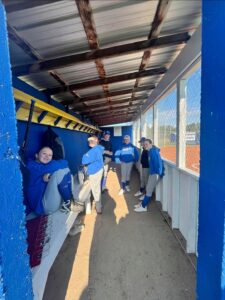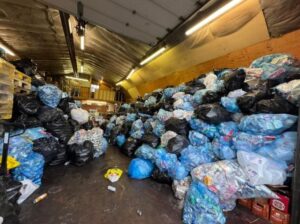“It’s been here for years. It’s just been hiding,” stated Wellspring Family Resource & Crisis Centre
Director Rebecca Wells. The staunch advocate for those facing crisis has been deeply entrenched in the
community’s dark side for years, working tirelessly to shed light on it. Human trafficking is something
most people would attribute to second or third-world countries, border towns or big cities. But here, in
Whitecourt?
The definition of human trafficking, as per Public Safety Canada, is “the act of recruiting, transporting, or
holding victims often to coerce them into providing manual labour or sexual services. Traffickers can
pressure victims in various ways to get someone to do something they are unwilling to do. It can involve
physical force or threats of violence, but in many cases, it doesn’t have to.” (www.canada.ca)
Wells said one of the most common ways she sees it happening locally is through those who are
homeless and couch surfing. “It starts good with someone letting them stay at their house, and then
next thing you know, they want something else, and these people are so desperate and have no place to
go, so they do it. Trading your body to have a place to sleep is human trafficking.”
Wells said on any given day, about 30 people in Whitecourt are trafficked, most of whom are stuck in
the dangerous cycle of doing favours to have a roof over their heads. “It’s not just a women’s thing; it’s
also a male thing, and we know that even with domestic violence. Whitecourt has been bad for many
years. It’s just that no one has talked about it,” said Wells.
She said Wellspring has worked with other provincial shelters to move those at risk of trafficking out of
their community. “I think all the shelters work well together, and we know how to help each other by
getting people out of town. We know they can’t stay where they are. Sometimes, it’s hard to convince
someone that their community isn’t good for them because they think these people are their friends.
But friends don’t let friends prostitute their bodies.”
Wells said Whitecourt doesn’t have enough to help support those being abused. “It’s usually the major
cities that have the help. Here in Whitecourt, we don’t have that help. We try our best, though.” She
said one thing she wishes Whitecourt had was a detox bed. “They can’t always come into our shelter
because if they are actively using, we don’t have the funding to have a detox nurse here to help them
safely detox.”
Wells has never done drugs herself, but her job has given her a strong understanding of what it’s like to
be in the throws of addiction, perpetuating the cycle of abuse. “It’s easier to steal stuff and do human
trafficking because it’s an easy way to make money. When you’re not thinking clearly, you may think it’s
not a terrible thing. Then, when you start coming down off the drugs and start feeling things and
remembering all the things you did, you want to bottle it up and keep using the drugs.”
Human trafficking can also be found in the youth. “We need to be talking about this with our kids. If they
are at a party and someone says they will give them something if they do something, that’s human
trafficking, especially when they use something as leverage like compromising pictures or information.
Human trafficking can look a lot different than people realize. It’s not like the 80s when people would
stand on the street corner. It’s more hidden now and online,” explained Wells.
As a mother, Wells said this topic needs to be front and centre. “I have three girls, and I am always
warning them about making sure they are safe. We should all live in a safe place.” Wells said growing
awareness is a start. “If there’s a house where you think there’s some questionable stuff happening or
you think someone you know is being coerced, used, or abused, don’t be afraid to say something. It
doesn’t hurt to call 9-1-1 and say you are concerned about it. They aren’t going to say your name and
that you called it in. It’s about speaking up when you think something is wrong.”
She said one of the industries that needs to be at the forefront of the conversation is hotels. “Often,
women are put up in hotels and are trafficked from there. We see them come through our shelter, and
it’s really hard.” She said there is training available for hotel staff but wasn’t sure if any local hotels had
taken any.
Wells said during the fires, when evacuees were in town, her staff dropped off pamphlets to the hotels,
and all were responsive. “They were great. They said they would put them in certain rooms because
they knew something was off. They can see that. In this case, they are essentially the front-line workers
because they see it first.”
With the human trafficking movie Sound of Freedom making waves worldwide, waking people up to the
horrors of child trafficking, Wells said the topic is essential to have out in the open. “This has been
happening for a long time, and people just didn’t know about it. The topic should be mainstream, and
people need to know it’s happening in our town.”
Wells said changing the language is a huge part of ending it. “There’s this idea that they deserve to be
mocked because they are an addict, or they’ve done things. But you’re human and deserve dignity and
respect, and selling your body is not okay. Instead of mocking someone, get them help. Call someone.”
Wellspring staff speak to students about age-appropriate topics like healthy relationships, how to
recognize unhealthy ones, and how to get help. Wells said they love being in the schools and are always
eager to bring the message to more classrooms. She said any teachers interested in age-appropriate
lessons for their classroom should contact Wellspring. It is the same for hotels seeking staff training to
recognize potential issues. “Please reach out,” said Wells.
“Shame and blame doesn’t do anything for anyone; it just makes it worse. I’ve even seen it where a
single parent doesn’t have enough money to support their family and has turned to prostitution to pay a
bill. It’s not right. These are our community members, and they need our compassion.” To learn more
about what the Province of Alberta is doing to combat human trafficking, visit www.alberta.ca/human-
trafficking-action-plan#9-point-plan.








More Stories
Community spirit shines at large-scale youth baseball event
Birthday party chaos sung beautifully by Pumpjack Players’ youth in spring musical
Gearing up for another season of cars, cruising and camaraderie